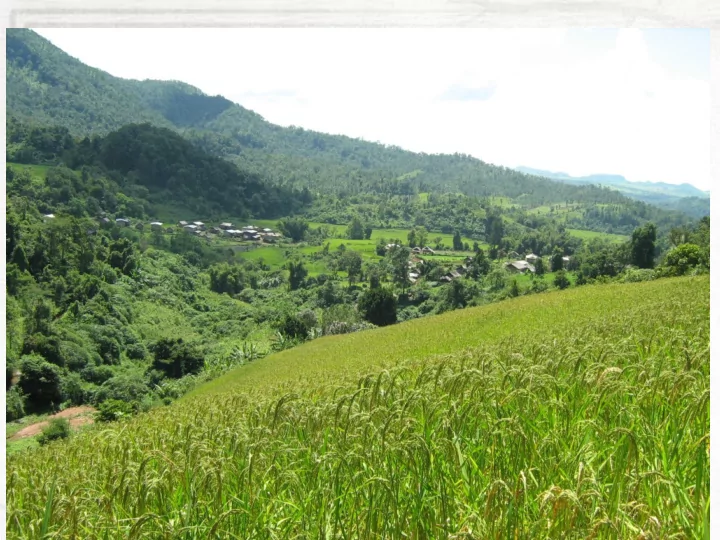

Background • Metta has been actively engaging with eco- friendly techniques for growing crops since 1998 • Initially Farmer Field Schools (FFS) began in 2001 in Kachin State, and now have been conducted in Kachin, Northern and Southern Shan, Kayar States and Ayeyawady Region
arwåm FFS to LIFT the food security of small and marginal land holder (2010-2013)
Specific Objective • To raise the food security and livelihoods status of the small and marginal farm holding households • To develop core groups of farmers skilled in upland rice farming • To develop a set of new practices effective to sustainably increase the productivity of rain- fed upland rice fields
A typical field school consists of 20-25 farmer participants. Season long field study. Adult and non-formal education. Experiential learning, discovery based and learning by doing. Farmers, in groups, are learning from the actual situation, which builds their confidence
System of rice intensification (upland rice) • Used of quality seed • Sowing in line with small number of seed rate • Used of modify drum seeder • Used of modify weeder for regular weeding • Used of organic manure and compost • Timely harvest
Project Target Target Project Site Township Target Villages House hold Hsi-hseng, Southern Shan Hopone, Taunggyi 150 3750 State and Pinlaung Putao, Machanbaw, Kachin State 50 1250 Sumparabum, NganYaung Total 8 200 5000
(TOT- 2011) 48 Graduated M(27) +F(21)
FFS Process Village Leaders’ Farmer level seed workshop production FFS planning Action research Establishment of Farmer field visit and FFS’s committee regular motoring Establishment of Cross visit and field days study plot and Cost and return analysis meeting place Participatory FFS’s regular monitoring and session evaluation Agro-ecosystem anlysis
FFS Planning
Meeting Place Establishment
Each FFS Established One Acre Study Plot
FFS’s regular sessions
Action Research
Cross Visit by FFS Participants
FFS’s Field day
Farmer Adaptation
Farmer Adaptation No of Farmer - 3,762 Total Acres - 4,774 Average Yield - 35 Baskets/acre Baseline Yield - 15-25 baskets/acre Net Increased Yield - 10 – 20 baskets/acre 4,774 acre X 10 basket = 47,740 baskets (2,387 mt) 47,740 baskets X 5 USD = 2,38,700 USD
Some Achievement • Enhance farmer decision making skill in upland rice farming • Reduce weeding time and labour cost • Increase women participation in different level • Men involvement in weeding • Enhance capacity of FFS committee • Reduce significant used of chemical • Increase food security period by 2 to 4 months
Challenges • Limited technology for rice in steep slope area • Access to remote and mountainous area during rainy season • Paying attention to cash crop rather than rice • Use of organic manure in large scale • Prominent use of herbicide in some area
Farmers’ innovation
Recommend
More recommend